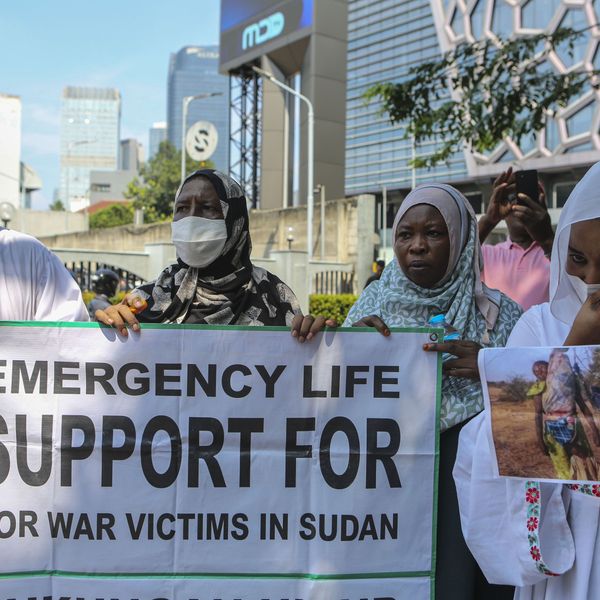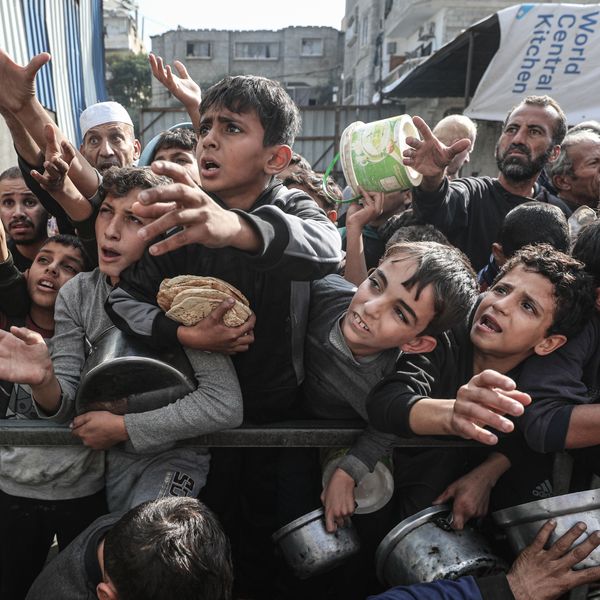Humanitarian Crisis in Syria Spirals With Confirmed Cases of Polio
Paralyzed children collateral damage of ongoing conflict
In another sign of the massive humanitarian crisis spiraling in Syria, the World Health Organization (WHO) confirmed on Tuesday 10 cases of polio--the first outbreak of the disease in the country in 14 years--and warned that the risk of the disease spreading was high.
The world health body stated that most of the cases of the highly contagious, crippling and potentially deadly disease were in children under 2 who were either not immunized or were under-immunized.
Another 12 cases of paralysis the WHO documented in the country's eastern province of Deir Al Zour are still being investigated to confirm if they were caused by polio as well.
Oliver Rosenbauer, spokesman of the WHO polio eradication program, told Reuters that "immunizations have started in that area."
The WHO estimates that the immunization rate in the country was just 68% in 2012, a drop from 91% just two years earlier.
"Of course this is a communicable disease, with population movements it can travel to other areas. So the risk is high for (its) spread across the region," Rosenbauer told a news conference.
Over two million Syrians have been forced to become refugees, fleeing to neighboring countries including Lebanon, Turkey and Iraq, and the UN fears that number could reach as high as five million by 2015. There are also currently 5 million internally displaced Syrians--refugees in their own country.
Ahead of the confirmation of the polio cases by the WHO, UNICEF announced plans for a large-scale immunization effort to target the 500,000 children in Syria that the last two years of fighting and insecurity have left vulnerable to polio and other preventable diseases.
Last week, UNICEF stated, "The conflict in Syria has caused immense displacement, with millions of children on the move, either inside the country or across borders into neighboring countries and beyond. As a result, routine immunization systems so critical to preventing childhood diseases have been disrupted or broken down, and children are now at far higher risk of diseases such as polio and measles."
Carolyn Miles, president and CEO of the international children's charity Save the Children, said the cases of polio were "another sign of the desperate and spiraling humanitarian situation" in Syria and demand "vaccination ceasefires." She added, "If chemical weapons inspectors can be allowed access across Syria with notebooks, surely aid workers can be allowed in with vaccines."
"Anytime you have half a million or more children who have not been reached with lifesaving vaccinations," UNICEF Executive Director Anthony Lake told the Associated Press, "then it is very urgent that you be able to get in to vaccinate them."
___________________
An Urgent Message From Our Co-Founder
Dear Common Dreams reader, The U.S. is on a fast track to authoritarianism like nothing I've ever seen. Meanwhile, corporate news outlets are utterly capitulating to Trump, twisting their coverage to avoid drawing his ire while lining up to stuff cash in his pockets. That's why I believe that Common Dreams is doing the best and most consequential reporting that we've ever done. Our small but mighty team is a progressive reporting powerhouse, covering the news every day that the corporate media never will. Our mission has always been simple: To inform. To inspire. And to ignite change for the common good. Now here's the key piece that I want all our readers to understand: None of this would be possible without your financial support. That's not just some fundraising cliche. It's the absolute and literal truth. We don't accept corporate advertising and never will. We don't have a paywall because we don't think people should be blocked from critical news based on their ability to pay. Everything we do is funded by the donations of readers like you. Will you donate now to help power the nonprofit, independent reporting of Common Dreams? Thank you for being a vital member of our community. Together, we can keep independent journalism alive when it’s needed most. - Craig Brown, Co-founder |
In another sign of the massive humanitarian crisis spiraling in Syria, the World Health Organization (WHO) confirmed on Tuesday 10 cases of polio--the first outbreak of the disease in the country in 14 years--and warned that the risk of the disease spreading was high.
The world health body stated that most of the cases of the highly contagious, crippling and potentially deadly disease were in children under 2 who were either not immunized or were under-immunized.
Another 12 cases of paralysis the WHO documented in the country's eastern province of Deir Al Zour are still being investigated to confirm if they were caused by polio as well.
Oliver Rosenbauer, spokesman of the WHO polio eradication program, told Reuters that "immunizations have started in that area."
The WHO estimates that the immunization rate in the country was just 68% in 2012, a drop from 91% just two years earlier.
"Of course this is a communicable disease, with population movements it can travel to other areas. So the risk is high for (its) spread across the region," Rosenbauer told a news conference.
Over two million Syrians have been forced to become refugees, fleeing to neighboring countries including Lebanon, Turkey and Iraq, and the UN fears that number could reach as high as five million by 2015. There are also currently 5 million internally displaced Syrians--refugees in their own country.
Ahead of the confirmation of the polio cases by the WHO, UNICEF announced plans for a large-scale immunization effort to target the 500,000 children in Syria that the last two years of fighting and insecurity have left vulnerable to polio and other preventable diseases.
Last week, UNICEF stated, "The conflict in Syria has caused immense displacement, with millions of children on the move, either inside the country or across borders into neighboring countries and beyond. As a result, routine immunization systems so critical to preventing childhood diseases have been disrupted or broken down, and children are now at far higher risk of diseases such as polio and measles."
Carolyn Miles, president and CEO of the international children's charity Save the Children, said the cases of polio were "another sign of the desperate and spiraling humanitarian situation" in Syria and demand "vaccination ceasefires." She added, "If chemical weapons inspectors can be allowed access across Syria with notebooks, surely aid workers can be allowed in with vaccines."
"Anytime you have half a million or more children who have not been reached with lifesaving vaccinations," UNICEF Executive Director Anthony Lake told the Associated Press, "then it is very urgent that you be able to get in to vaccinate them."
___________________
In another sign of the massive humanitarian crisis spiraling in Syria, the World Health Organization (WHO) confirmed on Tuesday 10 cases of polio--the first outbreak of the disease in the country in 14 years--and warned that the risk of the disease spreading was high.
The world health body stated that most of the cases of the highly contagious, crippling and potentially deadly disease were in children under 2 who were either not immunized or were under-immunized.
Another 12 cases of paralysis the WHO documented in the country's eastern province of Deir Al Zour are still being investigated to confirm if they were caused by polio as well.
Oliver Rosenbauer, spokesman of the WHO polio eradication program, told Reuters that "immunizations have started in that area."
The WHO estimates that the immunization rate in the country was just 68% in 2012, a drop from 91% just two years earlier.
"Of course this is a communicable disease, with population movements it can travel to other areas. So the risk is high for (its) spread across the region," Rosenbauer told a news conference.
Over two million Syrians have been forced to become refugees, fleeing to neighboring countries including Lebanon, Turkey and Iraq, and the UN fears that number could reach as high as five million by 2015. There are also currently 5 million internally displaced Syrians--refugees in their own country.
Ahead of the confirmation of the polio cases by the WHO, UNICEF announced plans for a large-scale immunization effort to target the 500,000 children in Syria that the last two years of fighting and insecurity have left vulnerable to polio and other preventable diseases.
Last week, UNICEF stated, "The conflict in Syria has caused immense displacement, with millions of children on the move, either inside the country or across borders into neighboring countries and beyond. As a result, routine immunization systems so critical to preventing childhood diseases have been disrupted or broken down, and children are now at far higher risk of diseases such as polio and measles."
Carolyn Miles, president and CEO of the international children's charity Save the Children, said the cases of polio were "another sign of the desperate and spiraling humanitarian situation" in Syria and demand "vaccination ceasefires." She added, "If chemical weapons inspectors can be allowed access across Syria with notebooks, surely aid workers can be allowed in with vaccines."
"Anytime you have half a million or more children who have not been reached with lifesaving vaccinations," UNICEF Executive Director Anthony Lake told the Associated Press, "then it is very urgent that you be able to get in to vaccinate them."
___________________

